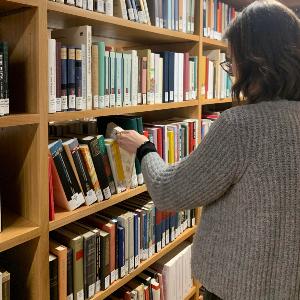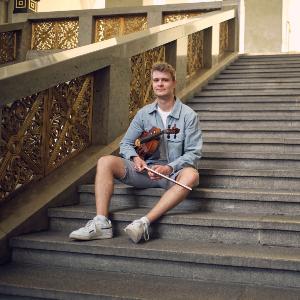Toward a healthy study-life balance
5 Jun 2023
Taking a breather from the demands of university life: LMU students talk about how hobbies recharge their batteries.
5 Jun 2023
Taking a breather from the demands of university life: LMU students talk about how hobbies recharge their batteries.
Striking the right balance between the rigorous demands of academic study and the need for rest and recovery is important for both physical and mental well-being.
Mirjam Eisermann from the Central Student Advisory Office who organizes workshops on achieving a healthy study-life balance receives this feedback again and again from LMU students. “Every car has to fill up with fuel again after a certain distance. Activities such as hobbies, sports and socializing help us recharge our batteries and stay in good shape physically and mentally. Only then can we avoid stress and master the challenges of everyday work and study.”
Sociology student Cynthia Lane Feiler takes a similar view: “I have noticed that my hobbies play a part in my mental health. It is better for me to go for a long walk than spend the same amount of time procrastinating at my desk.” Biology student Janik Ludwig suggests “finding hobbies that take place regularly. That gives you a structure and almost automatically creates a sense of balance.”

LMU student Leander Wolff on a motorcycle tour at the Amalfi Coast
“I am in my fourth semester of economics and my second semester of business studies. After writing ten exams in the last summer semester, I realized that I need to take a break from studying every day if I don’t want to exhaust myself. For me, there are three activities I desperately need: I love motorcycling. The feeling of freedom and the surge of adrenaline is something completely different from all the learning. When I ride my motorbike, I am completely immersed in the moment, so I forget about university. Since a long time I have the habit of going to a fitness studio – five times a week since the start of the year. During the exam period, I went every day, because that helped me take my mind off the exams. The exercise also reduces my stress levels, so I can concentrate on my learning again next morning. Another thing I do is cook fresh meals every day. For me, cooking in the evening marks the end of the day’s learning.
It’s useful to find leisure pursuits that are also rewarding. The progress I make at the fitness studio and the tasty meals I prepare for myself help keep me motivated.” Leander Wolff, economics and business management student
My tip for a healthy study-life balance is to prepare a learning schedule. You can then keep time free to do something else, something that does you good.Lisa Neunobel

Lisa Neunobel considers reading to be both a private pleasure and a daily study routine.
“I am in the fourth semester of a master’s degree in literature and media research, so I obviously have to read a lot. But I enjoy reading in my free time as well. I wouldn’t say reading is my only hobby, though. I also enjoy talking to my friends and fellow students about what we have read. That is part of my studies, but also part of my private life. Regular visits to one or other of my favorite bookstores is another aspect.
I read for at least one and a half hours a day, sometimes more at the weekends. Especially when things get stressful at university and at work, I can’t do without my private reading. That really helps me switch off – it gives me a timeout for the mind. At times like that, easier reading such as fantasy stories is a good idea.
When I read purely for pleasure and it has nothing to do with my studies, I feel like I have got my life under control. It also broadens my horizons and my vocabulary.
My tip for a healthy study-life balance is to prepare a learning schedule. You can then keep time free to do something else, something that does you good. I am also a big fan of to-do lists. It can be a real sense of release to put a tick by a job you have finished.” Lisa Neunobel, literature and media research student

Janik Ludwig plays the viola, is involved in the student council and likes doing sports. | © LMU / LCproductions
“I am a member of the symphony orchestra Sinfonietta. We meet every Wednesday night to go through our program together. This semester, we are playing Johann Strauss’s Die Fledermaus Overture, Tchaikovsky’s Variations on a Rococo Theme for cello and orchestra, and Dvorak’s Symphony No. 8. Alongside this rigorous program, you have to practice at home from time to time as well. And we also have two or three rehearsal weekends when the practice gets very intensive. I play the viola in this orchestra.
Every Monday evening, I also go to soccer training at the University Sports Center (ZHS). We do the training first and then play a game for the last hour. You meet students from all the different universities and disciplines there. If I can find the time, I play soccer on Thursdays as well, simply because I enjoy it so much. And at the moment, I try to visit the fitness studio twice a week on top of the soccer.
At my faculty I play an active role on a number of bodies. One of them is the Faculty Council, where decisions are made about the use of the faculty’s resources and, more generally, we liaise on issues surrounding research and teaching. My job is to represent the students’ perspective as best I can. What especially motivates me is working on the same level as the professors and having the chance to change things. That gives me the feeling of being involved in the everyday life of the university.
I think it is important to set priorities. University is my top priority, although you should also make an effort to have pursuits that are simply fun, even if they too can be strenuous. My advice would be to pluck up the courage and just try out a regular activity. It might be hard going to start with, but when you have done something regularly for three weeks, it becomes normal.” Janik Ludwig, biology student
My advice to other students is to establish a number of constants in your life.Dominik Hofbauer

Cynthia-Lane Feiler enjoys spending time in nature to recharge her batteries for everyday study.
“I try to go climbing or bouldering on a regular basis, at least twice a week. I enjoy it because there is always a social aspect to it: You can’t climb alone without having someone to secure you. When I’m up on the wall, I can switch off completely and have to concentrate on my movements. Climbing and bouldering can take up a lot of time. But when I am into my routine – usually during the lecturing period – I find it easier to do it on a regular basis.
I try to get around mostly by bike. I regularly go walking too, and occasionally hiking. Taking it easy and getting some exercise are the main things for me, as that is the best way to work off stress. For example, I sometimes take more scenic routes home, or cycle out into the country and then go for a little walk. When things get stressful, that’s when I really make time for simple things like cycling and walking. Those are things I enjoy doing alone and spontaneously, to take the pace off life. When I feel the need to take a whole day off and can fit it in, the best thing for me is to go hiking. It is important to me that, in all my hobbies, I get in touch with where I am at physically and mentally, with what I can and can’t do.
My advice is to keep your passion alive for a hobby that is fun and helps you switch off – ideally with an element of sport and exercise, as I think that does everyone good.” Cynthia-Lane Feiler, sociology student

As a balance to his daily study routine, Dominik Hofbauer likes to be creative.
“In my free time I really love photography. I actually started out with videos, but I have now moved over more and more to photography. Color grading is my specialism. Photography is not just my hobby, it is also a sideline job. I am thinking about going into it full time when I finish studying. Having said that, I always find it hard to be creative at the push of a button. That’s why I decided to study business management.
The more relaxed things are at university, the more time I have for my hobby, although photography is a constant in all aspects of my life. It is very important to me to do something creative to balance out my theoretical studies. For me, photography is a matter of the heart. It is a passion for art that motivates me. It is not primarily about making money.
My advice to other students is to establish a number of constants in your life. I think it is important not to live only for your studies, but also to occupy yourself with things you really enjoy. Being able to do both in parallel is fantastic. It is a great way to keep an open mind.” Dominik Hofbauer, business management student